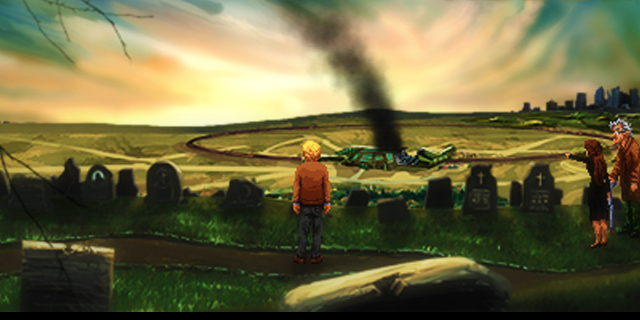
Resonance is a point-and-click adventure game. If you know from the get-go that the genre isn’t for you, then nothing presented here is going to change that. You’ll spend your time collecting inventory items, paying attention to dialogue and trying to figure out how the items in your inventory go together just so to solve the puzzle that’s stumping you. If you are a fan of the genre, though, then there’s a lot for you here. Resonance is one of the best modern adventure games I’ve ever played.
First, it’s nostalgic without feeling dated. The graphical style is reminiscent of mid-90s Sierra adventure games. If the subject matter weren’t so different, Resonance would look perfect snuggled right between King’s Quest VI and King’s Quest VII. This isn’t to say that the art is lazy, because it isn’t. It’s just very evocative of when the industry did more with less. Resonance is absolutely beautiful, and I wish that more developers were able to revisit graphical styles from PC gaming’s history so successfully. Where Resonance pulls away from the titles of 20 years ago is in its dialogue. The game is fully-voiced, and the voices are all well-done, too. You’ll even recognize one of them, Detective David Bennet, a police detective who you first meet breaking the rules while in a stakeout in a bad part of town. He’s voiced by Logan Cunningham, who you should all recognize as the narrator from Bastion.

Resonance is the tale of four seemingly-unrelated people. They’re all drawn together from different directions following the death of a particle physicist who was working on the titular resonance. In the intro, you control one of his coworkers and find out that he’s aiming to destroy his work, his notes, and his results. Everything. It’s everything that you can do to escape your apartment quickly, hop on the train, and get to work before something drastic happens. Another character is a police detective who gets wrapped up in everything while helping to clean things after a short blackout. Another is a reporter who is introduced more as a thief than a good guy. Your goal is to hack into a medical mainframe, and then watch where the story takes you. And the fourth is a young woman who you initially control as, and I’m not joking, she dreams about the time she ran away from a terrible monster as a little girl.
Resonance really goes out of its way to let you get to know the characters and slowly give you story bits at the same time. The storytelling is very well done, and the puzzles are usually not too obtuse to be figured out. There’s no failure either, if you mess up the game lets you know by rewinding to the last guaranteed safe state. You only have to save when you’re done playing for the day – the folks at xii aren’t out to punish you for getting wrapped up in Resonance’s world and forgetting to save.
It’s not all perfect, however. On the negative side, Resonance traded the adventure-game-stalwart notebook of clues for a short-term memory. The idea is interesting, but things aren’t added to it automatically, and without it characters are dumb as a post. You can’t remember the locked door when talking to the locksmith. This means you’re walking back, dragging the lock into your short-term memory, walking back to the locksmith, initiating the conversation, and then finally selecting the topic of conversation. In other adventure games, simply clicking on the lock and hearing the internal “Huh, it’s locked” would be enough to use that as a topic of conversation, but the extra step of “make my character remember this” has been added for no real reason.
At no point in my playthrough did I look at the short-term memory and think “this is better than way conversation options used to be handled.” It’s especially off-putting because you don’t always use it in intuitive ways. For example, I should not have to look at a clock and make sure that I remember that specific clock to ask somebody what time it is to cause them to leave work because their shift is over. Long-term memory is better, as the storytellers are able to use it to impart flashback information but still give the player control over whether it happens right now.
Overall, Resonance is a great example of modern adventure games. The visuals are great, the voice work is top-notch, and the story is well-worth the price of admission. It’s more serious than funny, but that’s okay; sometimes you need a little Gabriel Knight instead of Space Quest.
Pros: Beautiful graphics reminiscent of years gone by, great voice acting, interesting story
Cons: The short-term memory system is cumbersome and a step back from other adventure games’ conversation systems



















